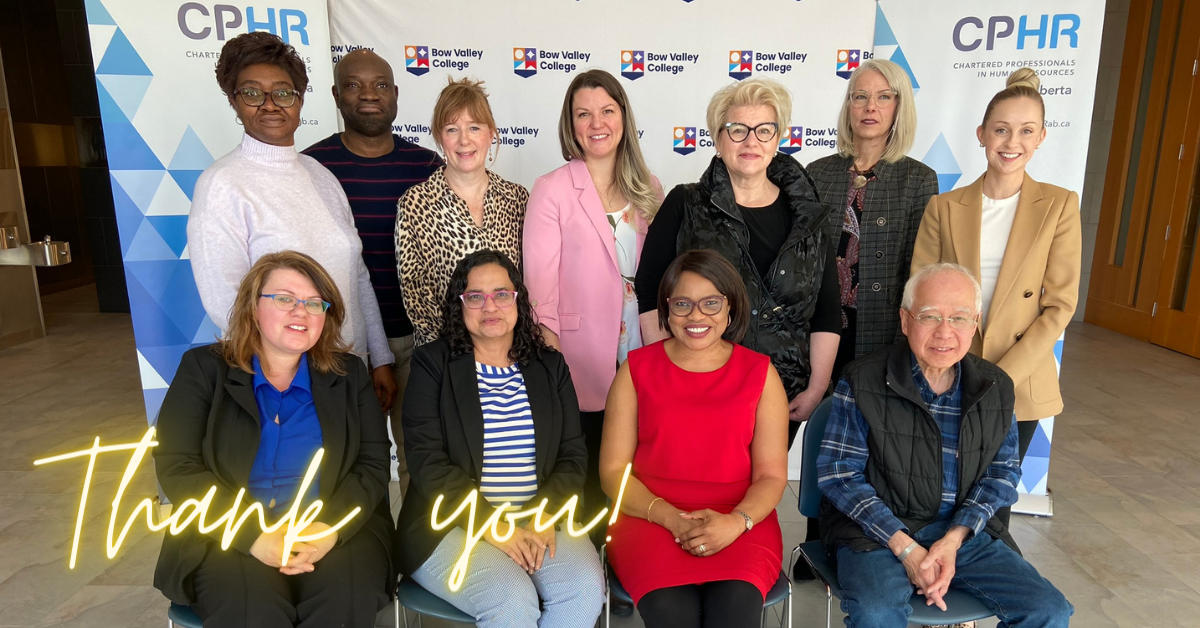
Celebrating Our Volunteers!

It’s National Volunteer Week, and we can’t brag about our incredible volunteers enough. Each year CPHR Alberta staff collaborate with our members to deliver on a number of initiatives, including professional development opportunities, engaging industry content, post-secondary and student engagement, continued evaluation and measurement of member conduct, mentorship and more. We are very fortunate to have an engaged HR community that is passionate about the profession.
In 2022, CPHR Alberta had 149 volunteers on 19 committees putting in over 1,300 volunteer hours!
Our staff leads have shared a few fun facts about our committees and some of the work our volunteers have completed this past year.
Chapter Committees
“The Chapter Committees are very instrumental in how CPHR Alberta delivers in-person and virtual Mingles and PD sessions. They are the face of the association; without them, CPHR Alberta would not be able to execute these events so efficiently. The care and detail they bring to the in-person events are amazing, engaging with Members and Non-members representing the best that CPHR Alberta and the HR Profession have to offer.”
Committee Lead – Nicole Bourgeois, Coordinator, Member Engagement
Conference Learning Committee
“This all-star committee is a close group and has a great time working together. They have the honoured task of vetting all of the proposals that are submitted for the conference and creating the line-up of stellar concurrent sessions for our annual hybrid conference. “
Committee Lead – Jessica Greenway, Manager, Manager, Conferences and Sponsorship
Editorial Committee
“This incredibly knowledgeable committee identifies annual industry hot topics that act as operational themes influencing our magazine, blog, research and professional development. They write over 20 original articles for the CPHR Alberta Magazine annually!”
Committee Lead – Bailey Beauchamp, Manager, Marketing and Communications
Mentorship Committee
“Our Mentorship Program matched over 130 relationships this past January! The committee has facilitated various Support Groups and is committed to better educating our members on the program with new initiatives in the upcoming intake. “
Committee Lead – Lynda Bergeron, Lead, Member Engagement
Discipline Committee
“Our Discipline Committee has reviewed and closed 17 formal complaints over the last three years. They exist to ensure that our members continue to adhere to the Code of Ethics and Standards of Professional Practice.”
Committee Lead – Erica Blain, Director, Professional Standards, Registrar
Appeals Committee
“The Appeals Committee is comprised of five Chartered Members, two of whom have been with the committee for 5+ years. In 2022, the committee received only one formal Appeal for review!”
Committee Lead – Erica Blain, Director, Professional Standards, Registrar
Registration Committee
“The Registration Committee is our largest committee with 32 Chartered Members. Our Registration Committee reviewed 21 Senior Path EVA applications and 113 EVA applications in 2022.”
Committee Leads – Erica Blain, Director, Professional Standards, Registrar
and
Fiona Amamoh, Professional Standards Coordinator
Student Advisory Council
“This pilot program launched in September 2022, and we are excited to announce that the program will continue into 2023-24!”
Committee Lead – Avi Sidhu, Coordinator, Post-Secondary
Ambassador Program
“The September 2022-23 intake of the ambassador program had representation from four chapters in Alberta!”
Committee Lead – Avi Sidhu, Coordinator, Post-Secondary
Awards Committee
"The Awards Committee sees the importance of the recognition in the HR community by nominating peers for excellent work. They may not have the easiest job with selecting the top candidates, but they are dedicated to learning about each nominee and the contributions and impact they have made!"
Committee Lead - Lynda Bergeron, Team Lead, Member Engagement
A huge thank you to all of our volunteers for their dedication and willingness to share their time and expertise with our staff, members and profession!
The views and opinions expressed in this blog post belong solely to the original author(s) and do not necessarily represent the views and opinions of CPHR Alberta.





